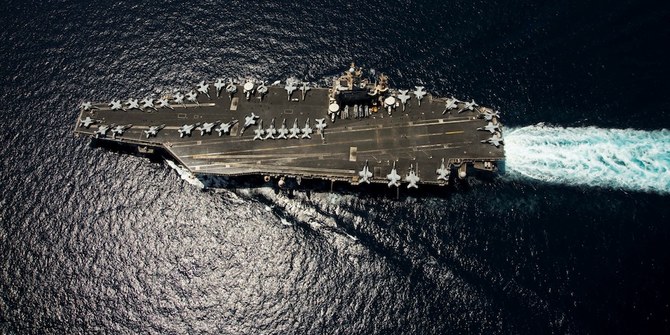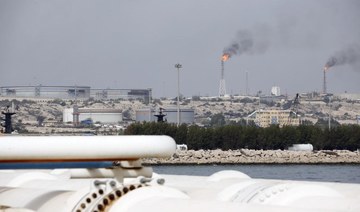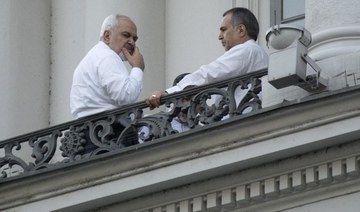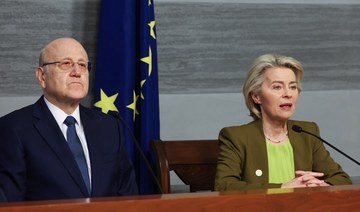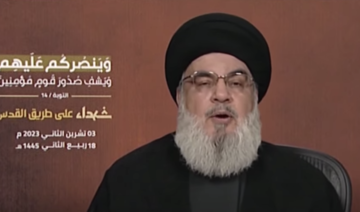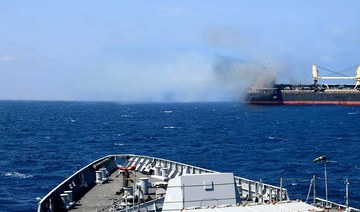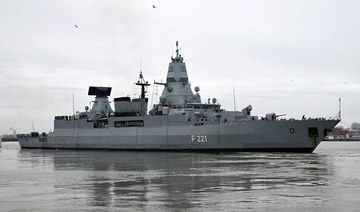WASHINGTON: The US is dispatching an aircraft carrier and other military resources to the Middle East following “clear indications” that Iran and its proxy forces were preparing to possibly attack US forces in the region.
US Acting Defense Secretary Shanahan said on Monday that the aircraft carrier and bombers ordered to Middle East were “prudent repositioning of assets in response to indications of a credible threat by Iranian regime forces.”
Shanahan said on Twitter that the US will hold the “Iranian regime accountable for any attack on US forces or our interests.”
At the White House, national security adviser John Bolton said Sunday night that the US is deploying the USS Abraham Lincoln Carrier Strike Group and a bomber task force to the US Central Command region, an area that includes the Middle East. In a statement, he said the move was in response to “a number of troubling and escalatory indications and warnings,” but did not provide more details.
US forces at sea and on land were thought to be the potential targets, and the Pentagon approved the deployments in response to those indications, according to the defense official, who spoke on the condition of anonymity because the official wasn’t authorized to speak publicly.
The Abraham Lincoln and its strike group of ships and combat aircraft have been operating in the Mediterranean Sea recently. Bolton’s reference to the Central Command area would mean the Lincoln is headed east to the Red Sea and perhaps then to the Arabian Sea or the Arabian Gulf, which would take several days. The US Navy currently has no aircraft carrier in the Arabian Gulf.
Bolton said the US wants to send a message that “unrelenting force” will meet any attack on US interests or those of its allies.
“The United States is not seeking war with the Iranian regime, but we are fully prepared to respond to any attack, whether by proxy, the Islamic Revolutionary Guard Corps, or regular Iranian forces,” he said.
Along with the Lincoln, Bolton mentioned “a bomber task force,” which suggested the Pentagon is deploying land-based bomber aircraft somewhere in the region, perhaps on the Arabian Peninsula.
Speaking to reporters while flying to Europe, Secretary of State Mike Pompeo said the actions undertaken by the US had been in the works for a little while.
“It is absolutely the case that we have seen escalatory actions from the Iranians and it is equally the case that we will hold the Iranians accountable for attacks on American interests,” Pompeo said. “If these actions take place, if they do by some third-party proxy, a militia group, Hezbollah, we will hold the Iranian leadership directly accountable for that.”
Asked about “escalatory actions,” Pompeo replied, “I don’t want to talk about what underlays it, but make no mistake, we have good reason to want to communicate clearly about how the Iranians should understand how we will respond to actions they may take.”
Asked if the Iranian action were related to the deadly events in Gaza and Israel — militants fired rockets into Israel on Sunday and Israel responded with airstrikes — Pompeo said, “It is separate from that.”
The Trump administration has been intensifying a pressure campaign against Iran.
Last month, President Donald Trump announced the US will no longer exempt any countries from US sanctions if they continue to buy Iranian oil, a decision that primarily affects the five remaining major importers: China and India and US treaty allies Japan, South Korea and Turkey.
The US also recently designated Iran’s Revolutionary Guard as a terrorist group, the first ever for an entire division of another government.
Trump withdrew from the Obama administration’s landmark nuclear deal with Iran in May 2018 and, in the months that followed, reimposed punishing sanctions including those targeting Iran’s oil, shipping and banking sectors.
Bolton and Pompeo have in recent months spoken stridently about Iran and its “malign activities” in the region.
Iran nuclear deal: from US exit to new sanctions
The United States unilaterally withdrew a year ago from a multi-country deal under which Iran had agreed to halt its nuclear programme in exchange for the lifting of biting sanctions.
Here are key developments in the bitter standoff since then.
On May 8, 2018, President Donald Trump announces the US withdrawal from the 2015 pact, saying "we cannot prevent an Iranian nuclear bomb under the decaying and rotten structure of the current agreement."
The move heralds the reinstatement of US sanctions, in two rounds.
The US warns other countries to end trade and investment in Iran and to stop buying its oil or face punitive measures.
But Britain, France, Germany -- who were also parties to the deal alongside Russia and China -- insist Iran has abided by its commitments to limit its nuclear activities, and say they are determined to save the agreement.
Iranian President Hassan Rouhani reacts that Tehran could scrap the curbs it agreed in the deal. But he calls on the remaining parties to save the accord.
Washington warns on May 21 that Tehran will be hit with the "strongest sanctions in history" unless it capitulates to further demands over its missile programme and "destabilising activities" in the Middle East.
A top US official says on July 2 that Washington is determined to force Iran to change its policies by slashing its oil exports.
On July 6, Tehran's five remaining partners in the nuclear accord vow to back "the continuation of Iran's exports of oil and gas".
On July 16, EU countries reject American demands to isolate Tehran economically.
A day later, European sources say the US has dismissed requests to spare EU firms from sanctions penalties.
On July 22, Rouhani warns the US that any conflict with Iran would be the "mother of all wars".
Trump tweets that he should stop making threats "OR YOU WILL SUFFER CONSEQUENCES".
On August 7, Washington reimposes a first set of sanctions that target Iran's access to US banknotes and key industries, including cars and carpets.
Within hours, German carmaker Daimler says it is halting its activities in Iran. French energy giant Total and other major international firms follow suit.
On November 5, the United States imposes the second wave of sanctions aimed at significantly reducing Iran's oil exports and cutting it off from international finance.
However it lists eight countries that will be granted temporary waivers: China, India, Italy, Greece, Japan, South Korea, Taiwan and Turkey.
At the end of January 2019, Britain, France and Germany launch a trade mechanism known as INSTEX in a bid to bypass US sanctions on Iran and allow Tehran to keep trading with EU companies.
On March 7 Washington accuses Iran of carrying out three missile-related launches and urges international measures.
On April 2, London, Paris and Berlin call for a UN report on Iran's ballistic missile activity.
On April 8, the United States designates Iran's elite military force, the Islamic Revolutionary Guard Corps, a "foreign terrorist organisation".
Tehran immediately declares Washington a "state sponsor of terrorism" and its forces in the region "terrorist groups".
On April 22, Trump announces his decision to cancel the sanctions exemptions on oil imports.
On April 28, Iran's Foreign Minister Mohammad Javad Zarif warns that leaving the 1970 Non-Proliferation Treaty -- aimed at stopping the spread of nuclear arms -- is among its "many options" for retaliation against US sanctions.




